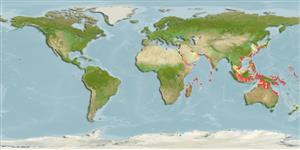Common names from other countries
>
Ophidiiformes (Cusk eels) >
Bythitidae (Livebearing brotulas)
Etymology: Microbrotula: Greek, mikros = small + Latin, brotula, -ae = little, bud, shoot (Ref. 45335); bentleyi: Named for Andrew Charles Bentley of Port Elizabeth, South Africa, now at the University of Kansas, USA, for his enthusiasm and help in the development of a program on western Indian Ocean fishes, and for collecting the holotype..
Environment: milieu / climate zone / depth range / distribution range
экология
морской ассоциированный с рифами; пределы глубины 0 - 55 m (Ref. 54832). Tropical
Indo-Pacific: South Africa to the Red Sea and from the Philippines to Cape York Peninsula in northern Australia; widely distributed and large gap in the distribution is probably a collecting artefact rather than indicative of a true distribution.
Size / Вес / Возраст
Maturity: Lm ? range ? - ? cm
Max length : 4.0 cm SL самец/пол неопределен; (Ref. 54832); 4.1 cm SL (female)
Краткое описание
морфология | морфометрия
членистые (мягкие) лучи спинного плавника (общее число): 61-70; членистые (мягкие) лучи анального плавника: 50 - 57; позвонки: 44 - 47. This species is distinguished by the following characters: vertebrae 11-12+33-35=44-47; fin rays, on dorsal 61-70, anal 50-57, pectoral 15-17, caudal 7-8; anterior dorsal fin ray above vertebra number 7-8, anterior anal fin ray below dorsal fin ray number 12-16, anterior anal fin ray below vertebra 13-16; small forward-curved spine at lower angle of preopercle, hidden by skin; fleshy interorbital width 4.5-7.0% SL; palatine teeth papillae-like or absent (Ref. 88975).
Found from near the surface to 55 meters in protected reef structures (Ref. 54832). Solitary inhabitant of reef crevices, cryptic (Ref 90102).
Life cycle and mating behavior
половая зрелость | размножение | нерест | икра | Fecundity | личинки
Schwarzhans, W. and J.G. Nielsen, 2011. Revision of the genus Microbrotula (Teleostei: Bythitidae), with description of two new species and a related new genus. The Beagle, Records of the Museums and Art Galleries of the Northern Territory 27:147-160. (Ref. 88975)
Статус Красного Списка МСОП (Ref. 130435)
CITES (Ref. 128078)
Not Evaluated
Угроза для людей
Harmless
Использование человеком
дополнительная информация
Возраст/РазмерыростЗависимость между длиной и массой телаЗависимость между длинамиРазмерный составморфометрияморфологияличинкидинамика численности личинокпополнениечисленность
ссылкиаквакультура (рыбоводство)особенности рыбоводствастепень растяжениягенетикаElectrophoresesнаследуемостьболезниобработкаMass conversion
соавторыизображенияStamps, Coins Misc.звукиCiguateraскоростьтип плаванияжаберная областьOtolithsмозгзрение
инструменты
Специальные отчеты
Скачать в формате XML
ресурсы в Интернет
Estimates based on models
Preferred temperature (Ref.
115969): 22.9 - 29, mean 27.5 (based on 576 cells).
Phylogenetic diversity index (Ref.
82804): PD
50 = 0.5039 [Uniqueness, from 0.5 = low to 2.0 = high].
Bayesian length-weight: a=0.00457 (0.00179 - 0.01169), b=3.10 (2.87 - 3.33), in cm Total Length, based on LWR estimates for this (Sub)family-body shape (Ref.
93245).
Trophic level (Ref.
69278): 3.2 ±0.5 se; based on size and trophs of closest relatives
устойчивость к внешним воздействиям (Ref.
120179): высокий, минимальное время удвоения популяции до 15 месяцев (Preliminary K or Fecundity.).
Fishing Vulnerability (Ref.
59153): Low vulnerability (10 of 100).
